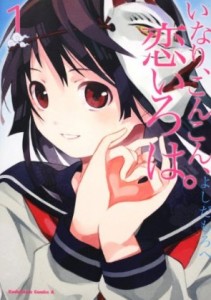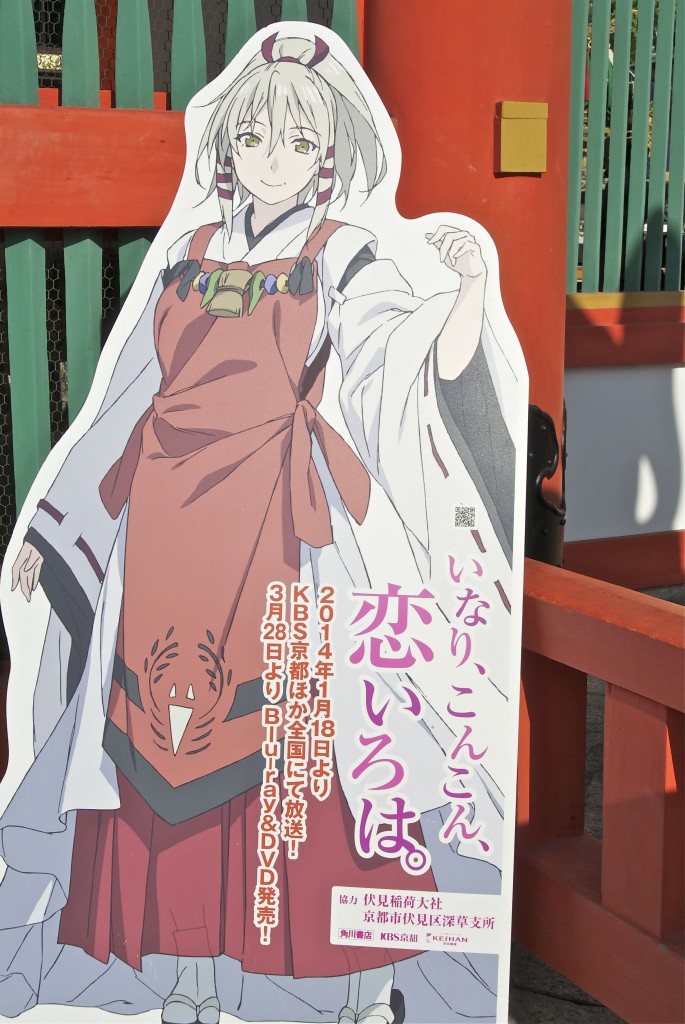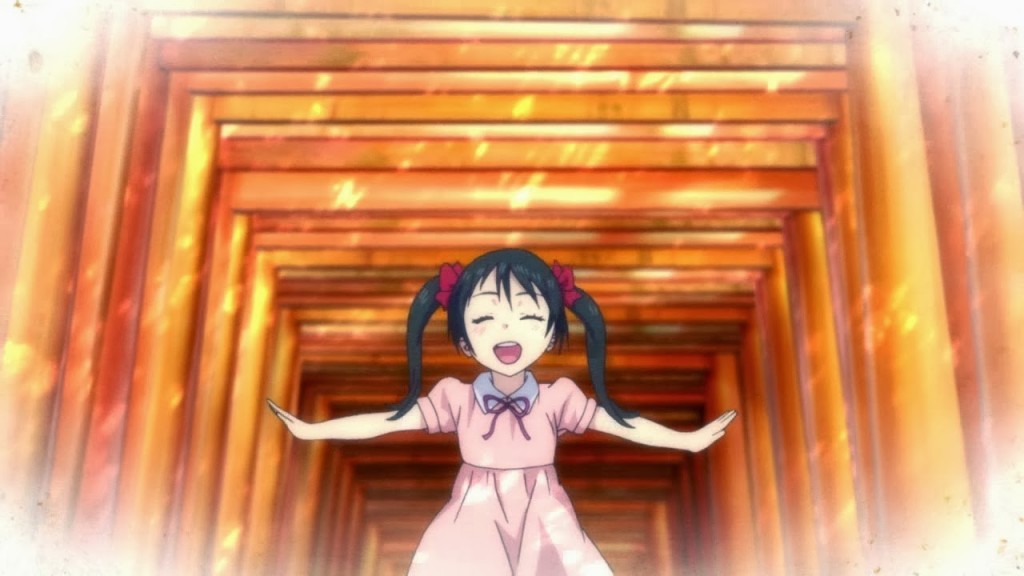
Cover of the manga starring schoolgirl, Inari Fushimi (copyright Morohe Yoshida)
On a recent visit to Fushimi Inari, I noticed a large display by the central gate advertising an anime called Inari, Kon Kon, Koi Iroha. I hadn’t heard of it, but it seems to have made a splash amongst the manga and anime crowd.
Since the shrine is trading on the publicity, I presume that they do not take exception to the contents. Indeed, they seem to be positively endorsing it. So when I get a chance, I’m going to look out for the series.
Meanwhile, the amazing Wikipedia has a full page devoted to it, from which the description below is taken. It’s a striking reminder of the power of imagination – and the lighter side of Shinto.
*****************************************
Wikipedia….
Inari, Konkon, Koi Iroha, also known as InaKon for short, is a Japanese manga series written and illustrated by Morohe Yoshida, which began serialization in Kadokawa Shoten’s Young Ace magazine from August 2010.
A television anime adaptation aired in Japan between January and March 2014.
Plot
Inari Fushimi is a clumsy girl who has a crush on classmate Kōji Tanbabashi. One day, after rescuing a fox pup named Kon from falling into a river, Inari is greeted by the shrine god Uka-no-Mitama-no-Kami, who gives Inari a portion of her power, allowing her to transform her appearance to that of any other human.
Main characters

Display at Fushimi Inari; exploiting the power of manga
Inari Fushimi
Inari is the main character. A middle school student. After saving a fox spirit from getting washed away in the river, she was granted with the power to change shape at will by uttering the phrase “Inari, Konkon”.
Later, it is hinted strongly that the power she received isn’t just the power to change shape; she has also unconsciously used the divine power to make her hopes come true.
After a series of events, during which she returns Uka’s powers but develops her own, Inari has entered new god training so that she can control her divine power and live with it as a human.
Outside of the gods, only Tōka and Kōji are aware of Inari’s powers and her relationship with the gods.
Uka-no-Mitama-no-Kami
Usually simply called “Uka”. After granting a wish by Inari to become someone else, which she came to regret, Uka gave Inari some of her power so that she may transform at will.
Despite being a god, she has great interest with otaku [nerdy] stuff and is usually seen playing games in her room. She appears to have developed feelings for Tōka [Inari’s older brother], much to the disdain of her fellow gods and mother.
Other gods
Kon
Uka’s familiar, who Inari saved from falling into a river. She is the smallest of the familiars, and was assigned to Inari according to her personality match. She can manifest herself to humans as a young fox-tailed girl wearing a hooded fox sweater. Kōji’s younger brother, Shirō, appears to like her.
ShiShi and RoRo
Uka’s familiars, older than Kon. They often stay close by Uka, who has them transform into games consoles.
Amaterasu Ōmikami
The head goddess of the sun who watches over Inari, making sure she can control her powers.
Ōtoshi-no-Kami
Known as “Toshi” for short. Uka’s older brother who has an incredible sister complex, which has disturbed Uka to the point where she has banned him from entering the Inari shrine.
Ōmiya-no-Me-no-Kami
One of the five pillar gods, known as “Miya” for short. [Inari consists of five different deities, counted as ‘pillars’]
***********************************************************************
To watch Episode 1 with subtitles, click here.
For an informed review of the first episode, see here.

(courtesy lostinanime.com)

I am well familiar with the series, and have kept up to date with it so for as it becomes available to me. I found Inari, Konkon, Koi Iroha to be a heartwarming series. A high school girl who makes friends with Uka-no-Mitama-no-Kami, the relationship between the two, and the interactions with every one around them. Both Fushimi Inari, and Uka are very caring individuals. Inari matures as she learns to control her new abilities, and Uka herself is depicted with some very human characteristics. I’d imagine the depiction of a divine kami with human characteristics would be part of the appeal. I personally find the idea of a divine being who knows and understands what it is to be human to be quite refreshing.